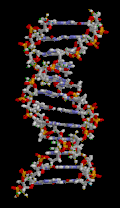Molecular biology
Molecular biology is a branch of biology focused on the structure and function of molecules involved in biological activity. It significantly overlaps with other disciplines, notably genetics and biochemistry, and provides the molecular underpinnings of life processes, enabling a deeper understanding of biological function at the most basic level.
Overview[edit]
Molecular biology primarily investigates the interactions between various systems of a cell, including the interrelationships of DNA, RNA, and protein synthesis, and learning how these interactions are regulated. It seeks to describe the structures and functions of these molecules, the mechanisms of their action, their roles in cellular interactions, and their utility in understanding the processes of life.
Key Concepts[edit]
Genetic Code[edit]
One of the central tenets of molecular biology lies in the genetic code, which is the set of rules defining how the four-letter code of DNA is translated into the 20-letter code of amino acids, which constitutes the building blocks of proteins.
Central Dogma[edit]
The central dogma of molecular biology describes the two-step process, transcription and translation, by which the information in genes flows into proteins. DNA is transcribed into messenger RNA (mRNA) in the nucleus, and this mRNA is then translated into protein in the cytoplasm.
DNA Replication[edit]
DNA replication, another fundamental concept, is the process by which DNA makes a copy of itself during cell division.
Techniques[edit]
Molecular biology employs numerous techniques, including polymerase chain reaction (PCR), gel electrophoresis, macromolecule blotting and probing, and microarrays. Next-generation sequencing technologies have also opened up new avenues for rapid and comprehensive analysis of genomes.
Applications[edit]
Applications of molecular biology include understanding the molecular mechanisms of diseases, the development of new therapies, and numerous techniques used in biotechnology and genetic engineering.
Relationship with Other Fields[edit]
While molecular biology is closely linked with the fields of biochemistry, which concerns the molecular and chemical interactions in biological cells, and genetics, which is the study of how traits are passed from parents to offspring, it focuses primarily on the nucleic acids and proteins – and how these molecules interact and control cellular processes.
References[edit]
- Alberts B, Johnson A, Lewis J, et al. Molecular Biology of the Cell. 4th edition. New York: Garland Science; 2002.
- Lodish H, Berk A, Zipursky SL, et al. Molecular Cell Biology. 4th edition. New York: W. H. Freeman; 2000.
- Berg JM, Tymoczko JL, Gatto GJ, Gatto GJ, Stryer L. Biochemistry. 7th edition. New York: W. H. Freeman; 2012.
|
|
|
| Molecular biology | ||||||||||||||||||||
|---|---|---|---|---|---|---|---|---|---|---|---|---|---|---|---|---|---|---|---|---|
|
| Branches of biology | ||
|---|---|---|
|
| Biotechnology | ||||||||||
|---|---|---|---|---|---|---|---|---|---|---|
|
| Branches of chemistry | ||||||||||
|---|---|---|---|---|---|---|---|---|---|---|
|
-
Molecular biology
-
Molecular biology
-
Molecular biology
-
Molecular biology
-
Molecular biology
-
Molecular biology
-
Molecular biology
-
Molecular biology
-
Molecular biology
-
Molecular biology
-
Molecular biology
-
Molecular biology
Ad. Transform your life with W8MD's Budget GLP-1 injections from $49.99


W8MD offers a medical weight loss program to lose weight in Philadelphia. Our physician-supervised medical weight loss provides:
- Weight loss injections in NYC (generic and brand names):
- Zepbound / Mounjaro, Wegovy / Ozempic, Saxenda
- Most insurances accepted or discounted self-pay rates. We will obtain insurance prior authorizations if needed.
- Generic GLP1 weight loss injections from $49.99 for the starting dose of Semaglutide and $65.00 for Tirzepatide.
- Also offer prescription weight loss medications including Phentermine, Qsymia, Diethylpropion, Contrave etc.
NYC weight loss doctor appointmentsNYC weight loss doctor appointments
Start your NYC weight loss journey today at our NYC medical weight loss and Philadelphia medical weight loss clinics.
- Call 718-946-5500 to lose weight in NYC or for medical weight loss in Philadelphia 215-676-2334.
- Tags:NYC medical weight loss, Philadelphia lose weight Zepbound NYC, Budget GLP1 weight loss injections, Wegovy Philadelphia, Wegovy NYC, Philadelphia medical weight loss, Brookly weight loss and Wegovy NYC
![]() Error creating thumbnail: Error creating thumbnail:
Error creating thumbnail: Error creating thumbnail:
![]()
|
WikiMD's Wellness Encyclopedia |
| Let Food Be Thy Medicine Medicine Thy Food - Hippocrates |
Medical Disclaimer: WikiMD is not a substitute for professional medical advice. The information on WikiMD is provided as an information resource only, may be incorrect, outdated or misleading, and is not to be used or relied on for any diagnostic or treatment purposes. Please consult your health care provider before making any healthcare decisions or for guidance about a specific medical condition. WikiMD expressly disclaims responsibility, and shall have no liability, for any damages, loss, injury, or liability whatsoever suffered as a result of your reliance on the information contained in this site. By visiting this site you agree to the foregoing terms and conditions, which may from time to time be changed or supplemented by WikiMD. If you do not agree to the foregoing terms and conditions, you should not enter or use this site. See full disclaimer.
Credits:Most images are courtesy of Wikimedia commons, and templates, categories Wikipedia, licensed under CC BY SA or similar.
Translate this page: - East Asian
中文,
日本,
한국어,
South Asian
हिन्दी,
தமிழ்,
తెలుగు,
Urdu,
ಕನ್ನಡ,
Southeast Asian
Indonesian,
Vietnamese,
Thai,
မြန်မာဘာသာ,
বাংলা
European
español,
Deutsch,
français,
Greek,
português do Brasil,
polski,
română,
русский,
Nederlands,
norsk,
svenska,
suomi,
Italian
Middle Eastern & African
عربى,
Turkish,
Persian,
Hebrew,
Afrikaans,
isiZulu,
Kiswahili,
Other
Bulgarian,
Hungarian,
Czech,
Swedish,
മലയാളം,
मराठी,
ਪੰਜਾਬੀ,
ગુજરાતી,
Portuguese,
Ukrainian



